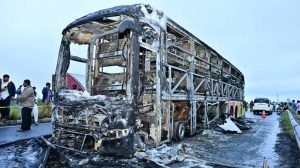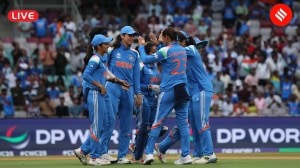Behind the chest thumping, India and Pak work through quieter channels to improve ties
Despite the open demonstrations of pique or aggression with each other, what is clear is that officials from both countries have been in touch with each other through quieter channels.
 File Photo: Foreign Secretary Subrahmanyan Jaishankar, left, poses for photographers, as he shakes hands with his Pakistani counterpart Aizaz Chaudhry at the foreign ministry in Islamabad. (Source: AP)
File Photo: Foreign Secretary Subrahmanyan Jaishankar, left, poses for photographers, as he shakes hands with his Pakistani counterpart Aizaz Chaudhry at the foreign ministry in Islamabad. (Source: AP)
A planned meeting of the Indian and Pakistani foreign secretaries in Delhi on Tuesday on the sidelines of the Heart of Asia conference on Afghanistan is a sign that both sides are trying their best to get the agreed upon Comprehensive Bilateral Dialogue off the ground.
Indian foreign secretary S. Jaishankar and his Pakistani counterpart Aizaz Ahmad Chaudhary were scheduled to meet on January 14 in Islamabad to chalk out the roadmap for the new CBD, but the Pathankot attack, for which India holds the Pakistan-based Jaish-e-Mohammed responsible, came in the way.
Despite the open demonstrations of pique or aggression with each other, which play out well in the galleries, what is clear is that officials from both countries have been in touch with each other through quieter channels. This now appears to be the preferred way on both sides for doing business with each other.
READ: Shiv Sena on Indo-Pak FS meet: ‘We know the outcome, it’s futile’
Gone, it seems, are the days, when in a fit of rage and under political compulsion, New Delhi would slam its hand on the “pause” button and keep it there for years. Over the last six months, there seems to have been a concerted effort by India to get out of the “stop-start” model, and keep the engagement going, mostly behind the scenes.
For one, there is the realization that beyond a point, the returns from “pause” are of the diminishing kind. Each time India sought to “punish” Pakistan by cutting off dialogue after a terror attack, it has ultimately returned to the table, without having gained any clear advantage from the “pause” period. The period that New Delhi “paused” the dialogue between the 2008 Mumbai attacks and last year also saw India’s marginalislation from the Afghanistan process. India has come to the conclusion, even though slightly late, that engagement with Pakistan is important to stay relevant in Afghanistan.
READ: India-Pak FS to meet today; to talk Pathankot terror strike, NIA visit
In the four months since the air base attack, contact between the two sides has continued, making possible the visit of the Joint Investigation Team from Pakistan to Pathankot. In between, despite the initial noise from New Delhi describing Pakistan’s arrest of Kulbhushan Jadhav in Balochistan as “rubbish”, there has been no attempt at grandstanding on this.
The foreign secretaries are likely to discuss the possibility of the Indian team’s “reciprocal” visit to Pakistan, but the future of the engagement is clearly not going to hinge on this. It is possible that the two officials may set another date for their derailed January 14 Islamabad meeting to kick off the Comprehensive Bilateral Dialogue.
Both India and Pakistan are also mindful that continuing engagement will ensure that the SAARC summit, to be held in November this year in Islamabad, takes place. All heads of government have to attend the summit – non-attendance by one means the summit gets cancelled. Other SAARC members have always held it against Pakistan and India that their bilateral hostility gets in the way of regional progress and development.
Certainly, neither side wants a situation in which this meeting of the heads of government of this eight-member regional group has to be called off. Least of all Prime Minister Narendra Modi, who began his tenure with a much-applauded outreach to the region. The pursuit of engagement with Pakistan has also earned Modi brownie points in the international community, and he is sure to be praised for this when he visits the U.S in June for a farewell call on President Barack Obama.
But setting hopes on any big breakthroughs in today’s engagement or in the coming week and months would be unwise. India has changed in many ways in the last two years, but Pakistan has changed faster in the last two months.
Prime Minister Nawaz Sharif, whose heart was always set on building bridges with India ever since the pre-Kargil Lahore Declaration, is much weaker than he was even a month ago, and his always fragile relationship with the Pakistan Army is even more so now.
The revelation, through the Panama papers leak, that his son and daughter have foreign accounts, has caused a huge blow to his credibility, which was, in Pakistani eyes, already bad in comparison with the larger than life image that Army chief General Raheel Sharif, has acquired.
More realistic would be to expect a constant engagement between the two sides, at least from now until November, sometimes in the public eye, sometimes out of it, with perhaps some incremental gains on issues such as cross-LoC , andIndia-Pakistan trade. Anything else would be a bonus.
WATCH INDIAN EXPRESS VIDEOS HERE





- 01
- 02
- 03
- 04
- 05

































